Comprehensive Analysis: Smoking's Impact on Oral Immune System
VerifiedAdded on 2022/12/27
|9
|2306
|35
Essay
AI Summary
This essay provides a comprehensive analysis of the detrimental effects of smoking on the oral immune system. It highlights how smoking negatively impacts oral health, leading to a weakened immune response, increased risk of infections, and a higher susceptibility to diseases like cancer and gum disease. The essay discusses the mechanisms by which smoking alters the oral environment, affecting the balance of bacteria and reducing the body's ability to fight off infections. It explores the impact on the mucous membrane, bacterial growth, and the formation of antibodies. Furthermore, the essay examines the specific oral effects of smoking, including tooth decay, bad breath, and gum recession. It also addresses the long-term consequences, such as increased risk of cardiovascular diseases and lung cancer. The essay emphasizes the importance of smoking cessation programs and the potential benefits of quitting smoking, such as improved oral health and overall well-being. It references several studies to support its claims and concludes by reiterating the significant risks smokers face and the critical need for interventions to mitigate the negative effects of tobacco use.
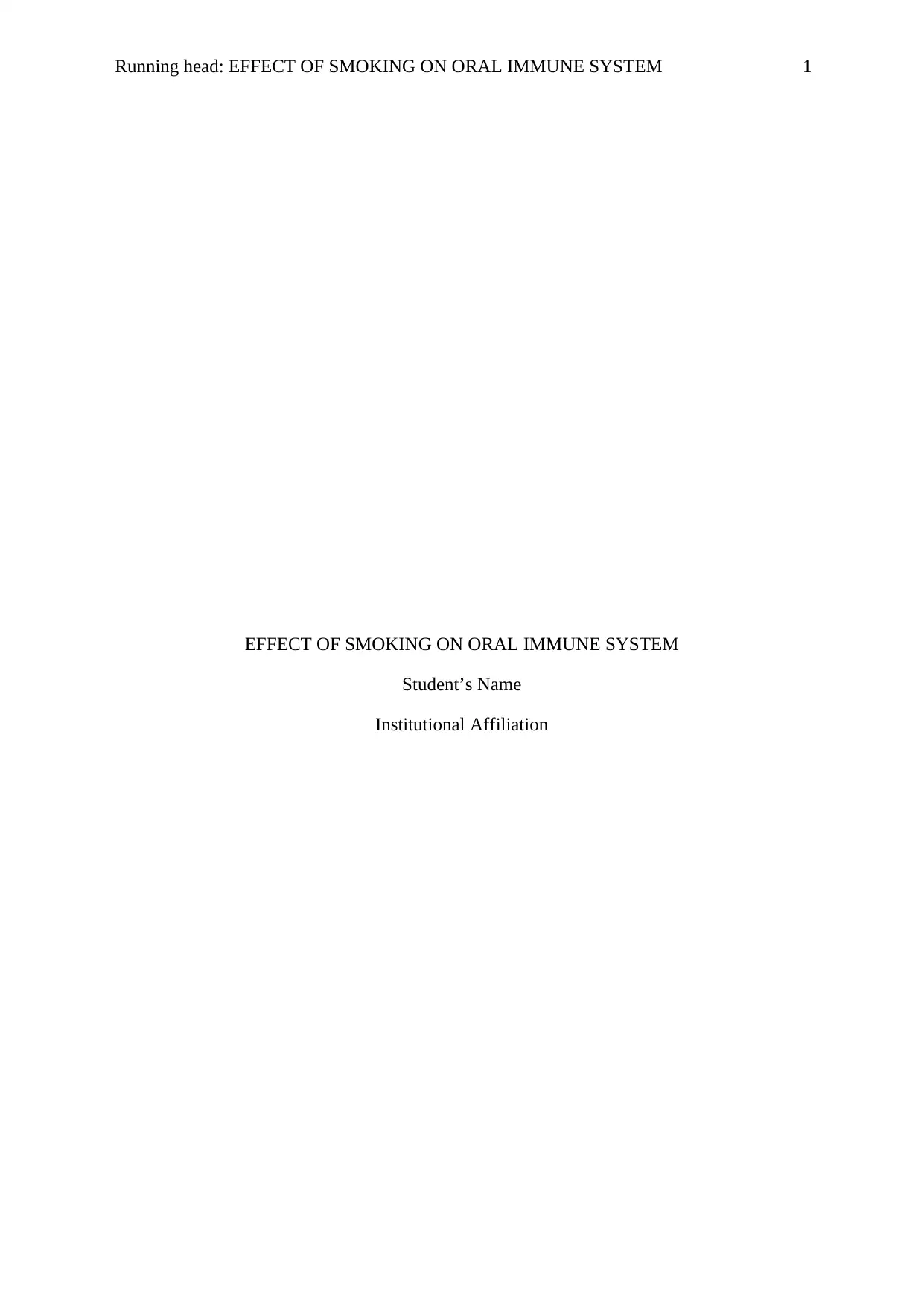
Running head: EFFECT OF SMOKING ON ORAL IMMUNE SYSTEM 1
EFFECT OF SMOKING ON ORAL IMMUNE SYSTEM
Student’s Name
Institutional Affiliation
EFFECT OF SMOKING ON ORAL IMMUNE SYSTEM
Student’s Name
Institutional Affiliation
Paraphrase This Document
Need a fresh take? Get an instant paraphrase of this document with our AI Paraphraser
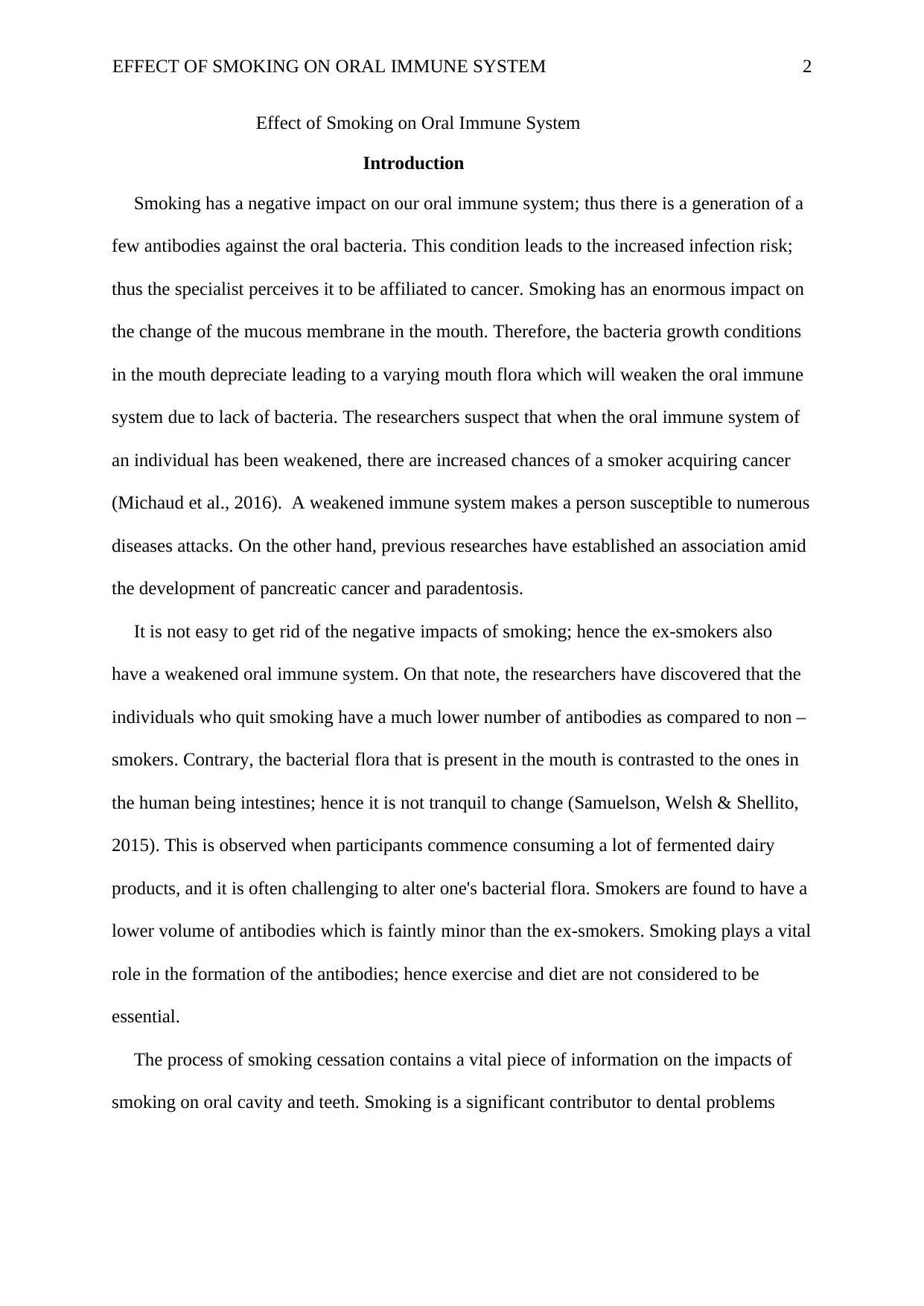
EFFECT OF SMOKING ON ORAL IMMUNE SYSTEM 2
Effect of Smoking on Oral Immune System
Introduction
Smoking has a negative impact on our oral immune system; thus there is a generation of a
few antibodies against the oral bacteria. This condition leads to the increased infection risk;
thus the specialist perceives it to be affiliated to cancer. Smoking has an enormous impact on
the change of the mucous membrane in the mouth. Therefore, the bacteria growth conditions
in the mouth depreciate leading to a varying mouth flora which will weaken the oral immune
system due to lack of bacteria. The researchers suspect that when the oral immune system of
an individual has been weakened, there are increased chances of a smoker acquiring cancer
(Michaud et al., 2016). A weakened immune system makes a person susceptible to numerous
diseases attacks. On the other hand, previous researches have established an association amid
the development of pancreatic cancer and paradentosis.
It is not easy to get rid of the negative impacts of smoking; hence the ex-smokers also
have a weakened oral immune system. On that note, the researchers have discovered that the
individuals who quit smoking have a much lower number of antibodies as compared to non –
smokers. Contrary, the bacterial flora that is present in the mouth is contrasted to the ones in
the human being intestines; hence it is not tranquil to change (Samuelson, Welsh & Shellito,
2015). This is observed when participants commence consuming a lot of fermented dairy
products, and it is often challenging to alter one's bacterial flora. Smokers are found to have a
lower volume of antibodies which is faintly minor than the ex-smokers. Smoking plays a vital
role in the formation of the antibodies; hence exercise and diet are not considered to be
essential.
The process of smoking cessation contains a vital piece of information on the impacts of
smoking on oral cavity and teeth. Smoking is a significant contributor to dental problems
Effect of Smoking on Oral Immune System
Introduction
Smoking has a negative impact on our oral immune system; thus there is a generation of a
few antibodies against the oral bacteria. This condition leads to the increased infection risk;
thus the specialist perceives it to be affiliated to cancer. Smoking has an enormous impact on
the change of the mucous membrane in the mouth. Therefore, the bacteria growth conditions
in the mouth depreciate leading to a varying mouth flora which will weaken the oral immune
system due to lack of bacteria. The researchers suspect that when the oral immune system of
an individual has been weakened, there are increased chances of a smoker acquiring cancer
(Michaud et al., 2016). A weakened immune system makes a person susceptible to numerous
diseases attacks. On the other hand, previous researches have established an association amid
the development of pancreatic cancer and paradentosis.
It is not easy to get rid of the negative impacts of smoking; hence the ex-smokers also
have a weakened oral immune system. On that note, the researchers have discovered that the
individuals who quit smoking have a much lower number of antibodies as compared to non –
smokers. Contrary, the bacterial flora that is present in the mouth is contrasted to the ones in
the human being intestines; hence it is not tranquil to change (Samuelson, Welsh & Shellito,
2015). This is observed when participants commence consuming a lot of fermented dairy
products, and it is often challenging to alter one's bacterial flora. Smokers are found to have a
lower volume of antibodies which is faintly minor than the ex-smokers. Smoking plays a vital
role in the formation of the antibodies; hence exercise and diet are not considered to be
essential.
The process of smoking cessation contains a vital piece of information on the impacts of
smoking on oral cavity and teeth. Smoking is a significant contributor to dental problems
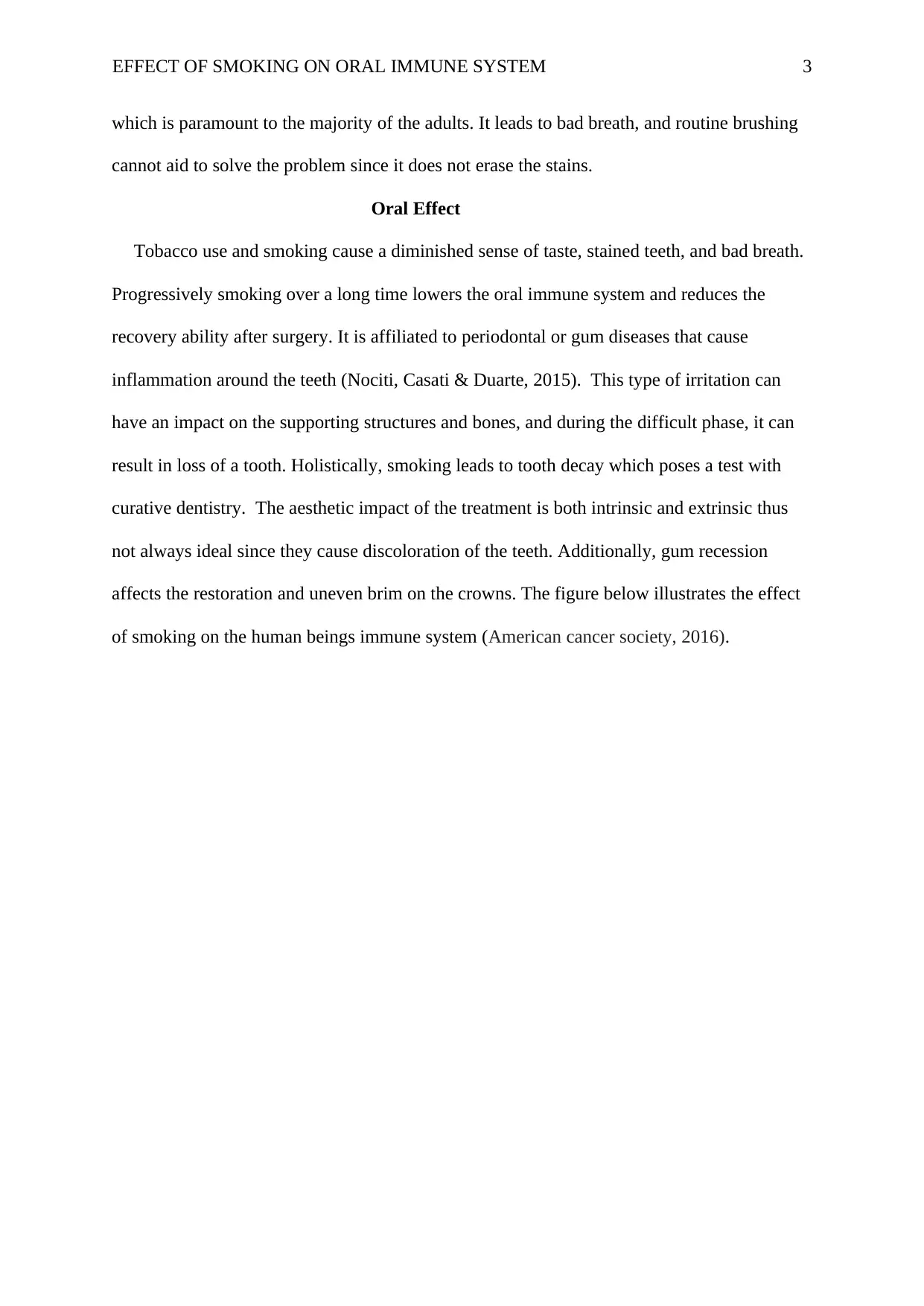
EFFECT OF SMOKING ON ORAL IMMUNE SYSTEM 3
which is paramount to the majority of the adults. It leads to bad breath, and routine brushing
cannot aid to solve the problem since it does not erase the stains.
Oral Effect
Tobacco use and smoking cause a diminished sense of taste, stained teeth, and bad breath.
Progressively smoking over a long time lowers the oral immune system and reduces the
recovery ability after surgery. It is affiliated to periodontal or gum diseases that cause
inflammation around the teeth (Nociti, Casati & Duarte, 2015). This type of irritation can
have an impact on the supporting structures and bones, and during the difficult phase, it can
result in loss of a tooth. Holistically, smoking leads to tooth decay which poses a test with
curative dentistry. The aesthetic impact of the treatment is both intrinsic and extrinsic thus
not always ideal since they cause discoloration of the teeth. Additionally, gum recession
affects the restoration and uneven brim on the crowns. The figure below illustrates the effect
of smoking on the human beings immune system (American cancer society, 2016).
which is paramount to the majority of the adults. It leads to bad breath, and routine brushing
cannot aid to solve the problem since it does not erase the stains.
Oral Effect
Tobacco use and smoking cause a diminished sense of taste, stained teeth, and bad breath.
Progressively smoking over a long time lowers the oral immune system and reduces the
recovery ability after surgery. It is affiliated to periodontal or gum diseases that cause
inflammation around the teeth (Nociti, Casati & Duarte, 2015). This type of irritation can
have an impact on the supporting structures and bones, and during the difficult phase, it can
result in loss of a tooth. Holistically, smoking leads to tooth decay which poses a test with
curative dentistry. The aesthetic impact of the treatment is both intrinsic and extrinsic thus
not always ideal since they cause discoloration of the teeth. Additionally, gum recession
affects the restoration and uneven brim on the crowns. The figure below illustrates the effect
of smoking on the human beings immune system (American cancer society, 2016).
⊘ This is a preview!⊘
Do you want full access?
Subscribe today to unlock all pages.

Trusted by 1+ million students worldwide
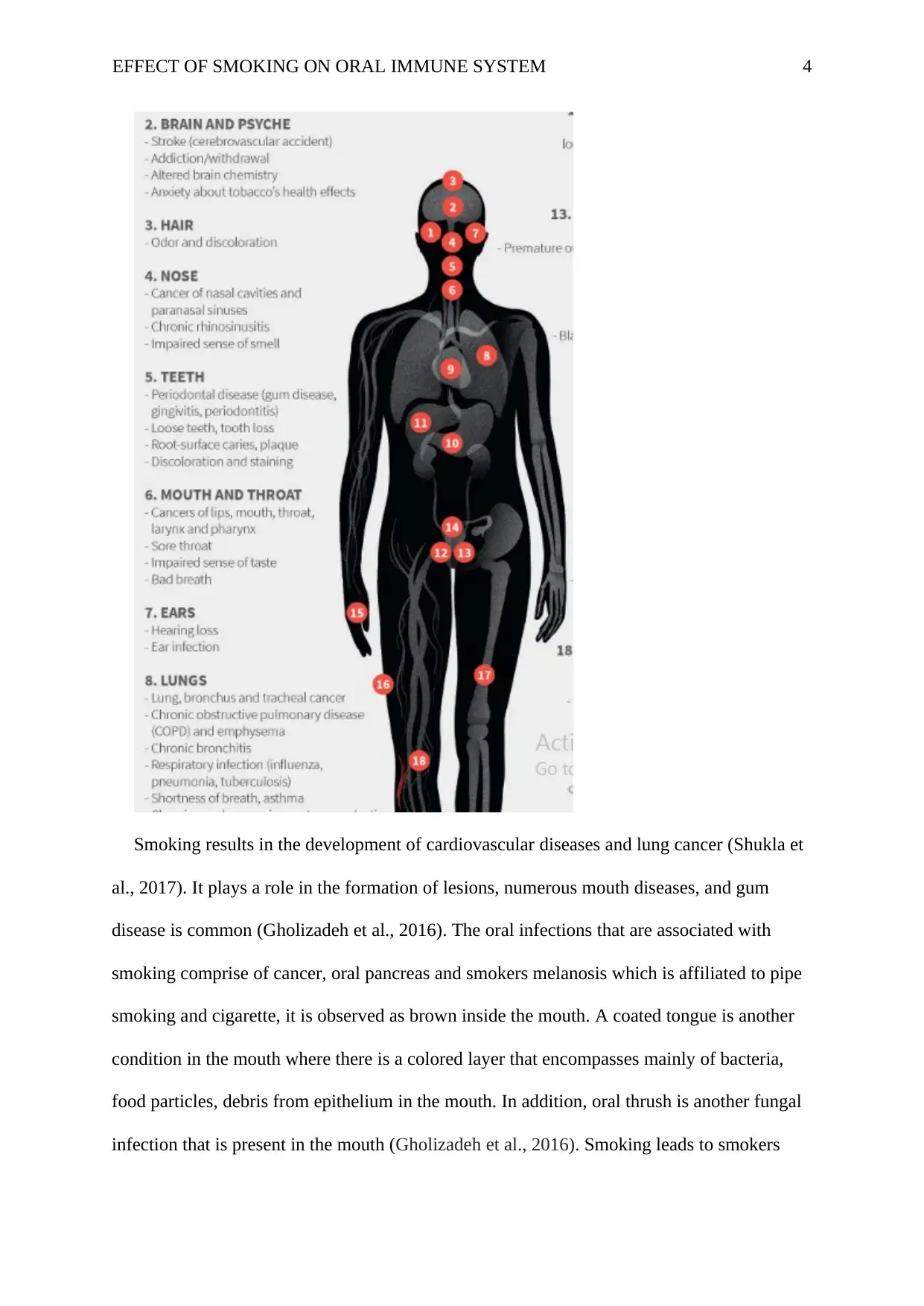
EFFECT OF SMOKING ON ORAL IMMUNE SYSTEM 4
Smoking results in the development of cardiovascular diseases and lung cancer (Shukla et
al., 2017). It plays a role in the formation of lesions, numerous mouth diseases, and gum
disease is common (Gholizadeh et al., 2016). The oral infections that are associated with
smoking comprise of cancer, oral pancreas and smokers melanosis which is affiliated to pipe
smoking and cigarette, it is observed as brown inside the mouth. A coated tongue is another
condition in the mouth where there is a colored layer that encompasses mainly of bacteria,
food particles, debris from epithelium in the mouth. In addition, oral thrush is another fungal
infection that is present in the mouth (Gholizadeh et al., 2016). Smoking leads to smokers
Smoking results in the development of cardiovascular diseases and lung cancer (Shukla et
al., 2017). It plays a role in the formation of lesions, numerous mouth diseases, and gum
disease is common (Gholizadeh et al., 2016). The oral infections that are associated with
smoking comprise of cancer, oral pancreas and smokers melanosis which is affiliated to pipe
smoking and cigarette, it is observed as brown inside the mouth. A coated tongue is another
condition in the mouth where there is a colored layer that encompasses mainly of bacteria,
food particles, debris from epithelium in the mouth. In addition, oral thrush is another fungal
infection that is present in the mouth (Gholizadeh et al., 2016). Smoking leads to smokers
Paraphrase This Document
Need a fresh take? Get an instant paraphrase of this document with our AI Paraphraser
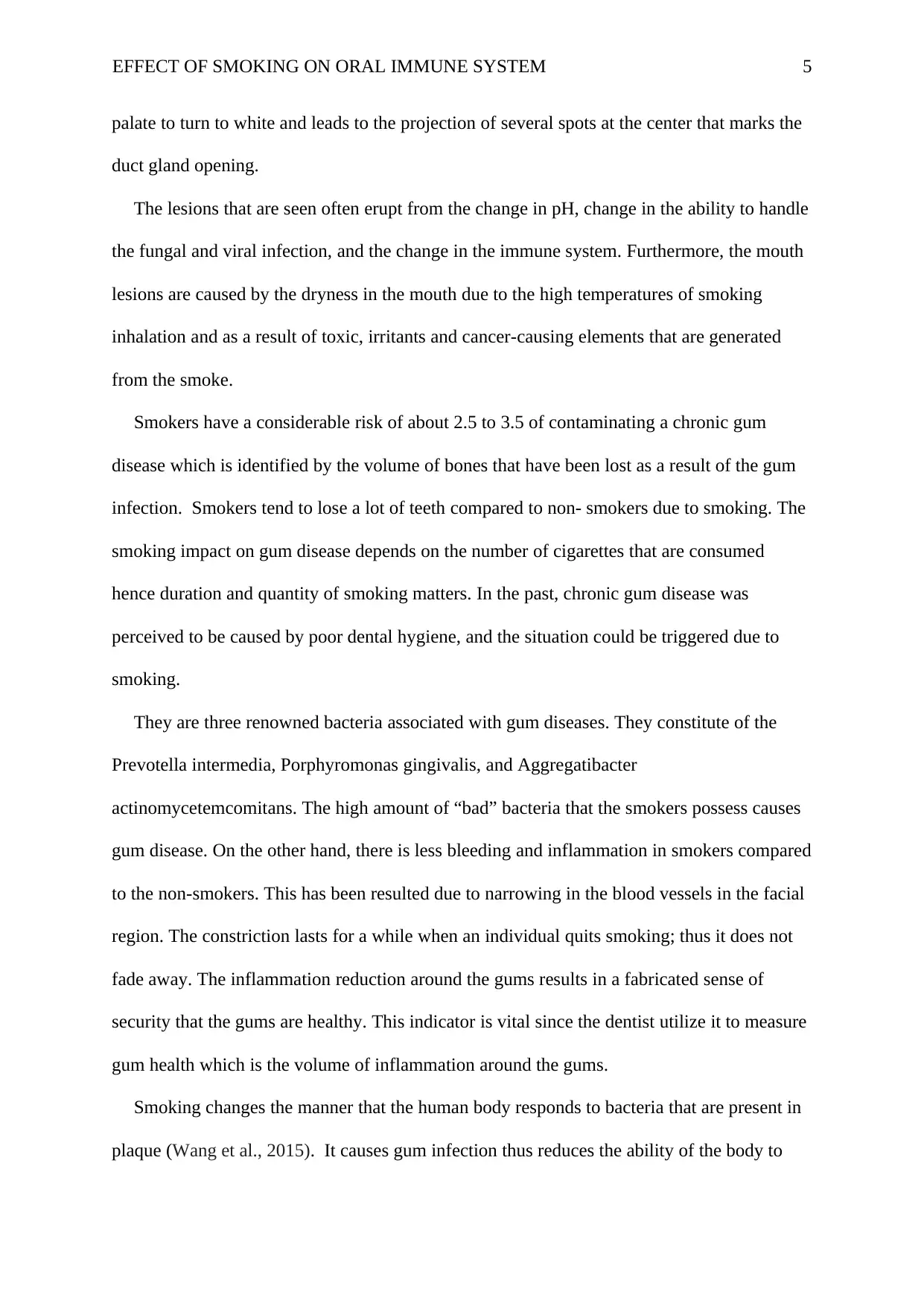
EFFECT OF SMOKING ON ORAL IMMUNE SYSTEM 5
palate to turn to white and leads to the projection of several spots at the center that marks the
duct gland opening.
The lesions that are seen often erupt from the change in pH, change in the ability to handle
the fungal and viral infection, and the change in the immune system. Furthermore, the mouth
lesions are caused by the dryness in the mouth due to the high temperatures of smoking
inhalation and as a result of toxic, irritants and cancer-causing elements that are generated
from the smoke.
Smokers have a considerable risk of about 2.5 to 3.5 of contaminating a chronic gum
disease which is identified by the volume of bones that have been lost as a result of the gum
infection. Smokers tend to lose a lot of teeth compared to non- smokers due to smoking. The
smoking impact on gum disease depends on the number of cigarettes that are consumed
hence duration and quantity of smoking matters. In the past, chronic gum disease was
perceived to be caused by poor dental hygiene, and the situation could be triggered due to
smoking.
They are three renowned bacteria associated with gum diseases. They constitute of the
Prevotella intermedia, Porphyromonas gingivalis, and Aggregatibacter
actinomycetemcomitans. The high amount of “bad” bacteria that the smokers possess causes
gum disease. On the other hand, there is less bleeding and inflammation in smokers compared
to the non-smokers. This has been resulted due to narrowing in the blood vessels in the facial
region. The constriction lasts for a while when an individual quits smoking; thus it does not
fade away. The inflammation reduction around the gums results in a fabricated sense of
security that the gums are healthy. This indicator is vital since the dentist utilize it to measure
gum health which is the volume of inflammation around the gums.
Smoking changes the manner that the human body responds to bacteria that are present in
plaque (Wang et al., 2015). It causes gum infection thus reduces the ability of the body to
palate to turn to white and leads to the projection of several spots at the center that marks the
duct gland opening.
The lesions that are seen often erupt from the change in pH, change in the ability to handle
the fungal and viral infection, and the change in the immune system. Furthermore, the mouth
lesions are caused by the dryness in the mouth due to the high temperatures of smoking
inhalation and as a result of toxic, irritants and cancer-causing elements that are generated
from the smoke.
Smokers have a considerable risk of about 2.5 to 3.5 of contaminating a chronic gum
disease which is identified by the volume of bones that have been lost as a result of the gum
infection. Smokers tend to lose a lot of teeth compared to non- smokers due to smoking. The
smoking impact on gum disease depends on the number of cigarettes that are consumed
hence duration and quantity of smoking matters. In the past, chronic gum disease was
perceived to be caused by poor dental hygiene, and the situation could be triggered due to
smoking.
They are three renowned bacteria associated with gum diseases. They constitute of the
Prevotella intermedia, Porphyromonas gingivalis, and Aggregatibacter
actinomycetemcomitans. The high amount of “bad” bacteria that the smokers possess causes
gum disease. On the other hand, there is less bleeding and inflammation in smokers compared
to the non-smokers. This has been resulted due to narrowing in the blood vessels in the facial
region. The constriction lasts for a while when an individual quits smoking; thus it does not
fade away. The inflammation reduction around the gums results in a fabricated sense of
security that the gums are healthy. This indicator is vital since the dentist utilize it to measure
gum health which is the volume of inflammation around the gums.
Smoking changes the manner that the human body responds to bacteria that are present in
plaque (Wang et al., 2015). It causes gum infection thus reduces the ability of the body to
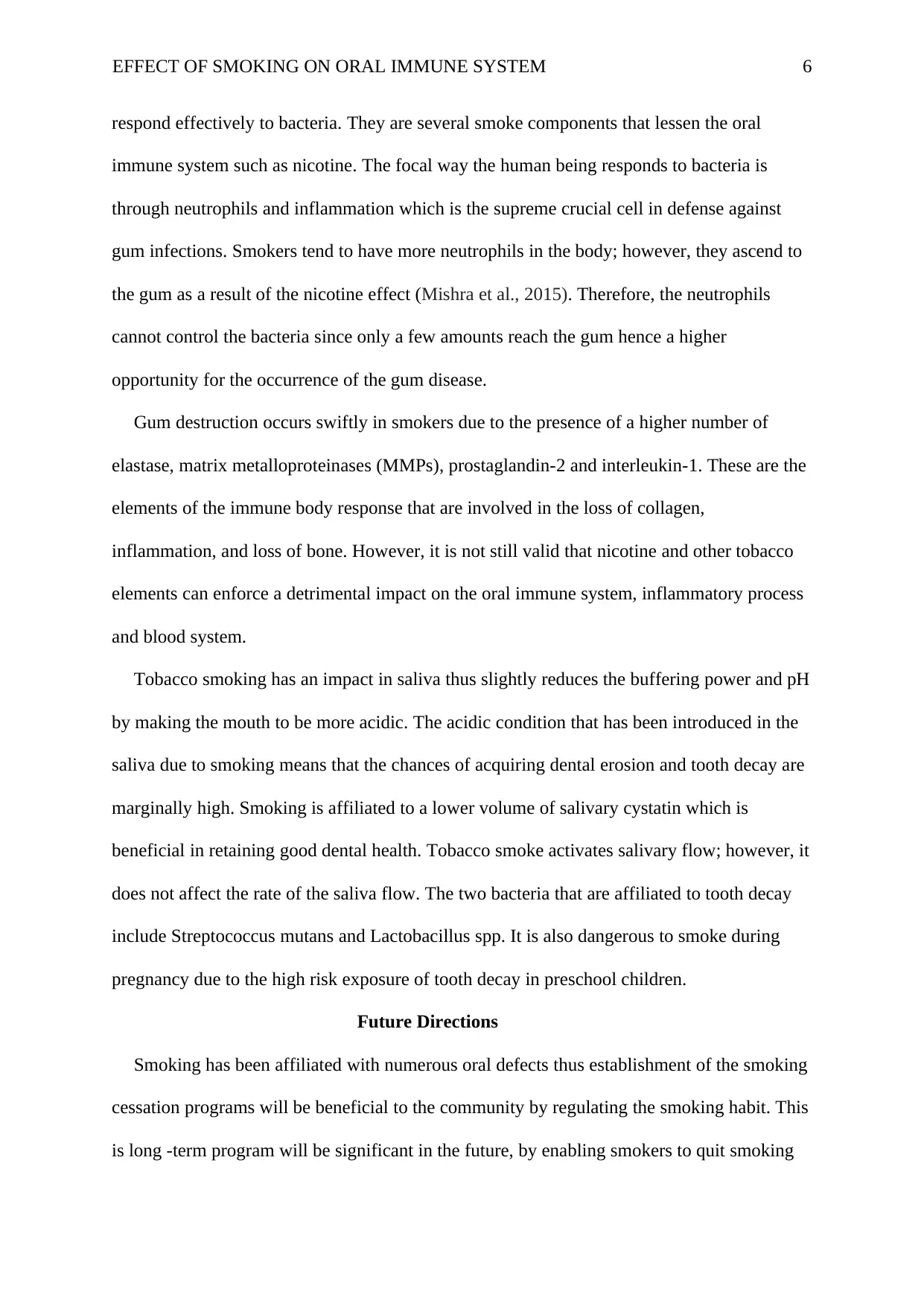
EFFECT OF SMOKING ON ORAL IMMUNE SYSTEM 6
respond effectively to bacteria. They are several smoke components that lessen the oral
immune system such as nicotine. The focal way the human being responds to bacteria is
through neutrophils and inflammation which is the supreme crucial cell in defense against
gum infections. Smokers tend to have more neutrophils in the body; however, they ascend to
the gum as a result of the nicotine effect (Mishra et al., 2015). Therefore, the neutrophils
cannot control the bacteria since only a few amounts reach the gum hence a higher
opportunity for the occurrence of the gum disease.
Gum destruction occurs swiftly in smokers due to the presence of a higher number of
elastase, matrix metalloproteinases (MMPs), prostaglandin-2 and interleukin-1. These are the
elements of the immune body response that are involved in the loss of collagen,
inflammation, and loss of bone. However, it is not still valid that nicotine and other tobacco
elements can enforce a detrimental impact on the oral immune system, inflammatory process
and blood system.
Tobacco smoking has an impact in saliva thus slightly reduces the buffering power and pH
by making the mouth to be more acidic. The acidic condition that has been introduced in the
saliva due to smoking means that the chances of acquiring dental erosion and tooth decay are
marginally high. Smoking is affiliated to a lower volume of salivary cystatin which is
beneficial in retaining good dental health. Tobacco smoke activates salivary flow; however, it
does not affect the rate of the saliva flow. The two bacteria that are affiliated to tooth decay
include Streptococcus mutans and Lactobacillus spp. It is also dangerous to smoke during
pregnancy due to the high risk exposure of tooth decay in preschool children.
Future Directions
Smoking has been affiliated with numerous oral defects thus establishment of the smoking
cessation programs will be beneficial to the community by regulating the smoking habit. This
is long -term program will be significant in the future, by enabling smokers to quit smoking
respond effectively to bacteria. They are several smoke components that lessen the oral
immune system such as nicotine. The focal way the human being responds to bacteria is
through neutrophils and inflammation which is the supreme crucial cell in defense against
gum infections. Smokers tend to have more neutrophils in the body; however, they ascend to
the gum as a result of the nicotine effect (Mishra et al., 2015). Therefore, the neutrophils
cannot control the bacteria since only a few amounts reach the gum hence a higher
opportunity for the occurrence of the gum disease.
Gum destruction occurs swiftly in smokers due to the presence of a higher number of
elastase, matrix metalloproteinases (MMPs), prostaglandin-2 and interleukin-1. These are the
elements of the immune body response that are involved in the loss of collagen,
inflammation, and loss of bone. However, it is not still valid that nicotine and other tobacco
elements can enforce a detrimental impact on the oral immune system, inflammatory process
and blood system.
Tobacco smoking has an impact in saliva thus slightly reduces the buffering power and pH
by making the mouth to be more acidic. The acidic condition that has been introduced in the
saliva due to smoking means that the chances of acquiring dental erosion and tooth decay are
marginally high. Smoking is affiliated to a lower volume of salivary cystatin which is
beneficial in retaining good dental health. Tobacco smoke activates salivary flow; however, it
does not affect the rate of the saliva flow. The two bacteria that are affiliated to tooth decay
include Streptococcus mutans and Lactobacillus spp. It is also dangerous to smoke during
pregnancy due to the high risk exposure of tooth decay in preschool children.
Future Directions
Smoking has been affiliated with numerous oral defects thus establishment of the smoking
cessation programs will be beneficial to the community by regulating the smoking habit. This
is long -term program will be significant in the future, by enabling smokers to quit smoking
⊘ This is a preview!⊘
Do you want full access?
Subscribe today to unlock all pages.

Trusted by 1+ million students worldwide
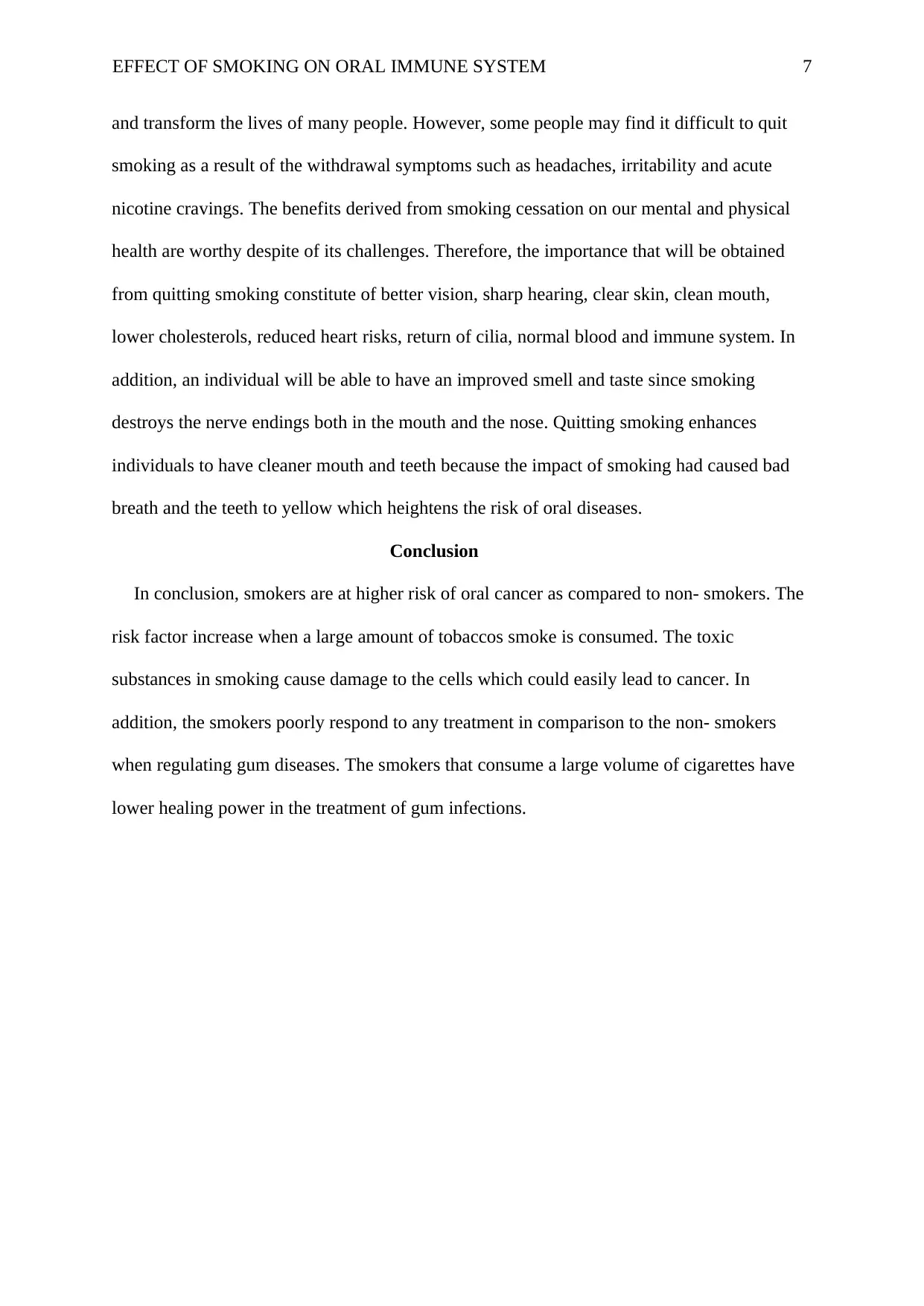
EFFECT OF SMOKING ON ORAL IMMUNE SYSTEM 7
and transform the lives of many people. However, some people may find it difficult to quit
smoking as a result of the withdrawal symptoms such as headaches, irritability and acute
nicotine cravings. The benefits derived from smoking cessation on our mental and physical
health are worthy despite of its challenges. Therefore, the importance that will be obtained
from quitting smoking constitute of better vision, sharp hearing, clear skin, clean mouth,
lower cholesterols, reduced heart risks, return of cilia, normal blood and immune system. In
addition, an individual will be able to have an improved smell and taste since smoking
destroys the nerve endings both in the mouth and the nose. Quitting smoking enhances
individuals to have cleaner mouth and teeth because the impact of smoking had caused bad
breath and the teeth to yellow which heightens the risk of oral diseases.
Conclusion
In conclusion, smokers are at higher risk of oral cancer as compared to non- smokers. The
risk factor increase when a large amount of tobaccos smoke is consumed. The toxic
substances in smoking cause damage to the cells which could easily lead to cancer. In
addition, the smokers poorly respond to any treatment in comparison to the non- smokers
when regulating gum diseases. The smokers that consume a large volume of cigarettes have
lower healing power in the treatment of gum infections.
and transform the lives of many people. However, some people may find it difficult to quit
smoking as a result of the withdrawal symptoms such as headaches, irritability and acute
nicotine cravings. The benefits derived from smoking cessation on our mental and physical
health are worthy despite of its challenges. Therefore, the importance that will be obtained
from quitting smoking constitute of better vision, sharp hearing, clear skin, clean mouth,
lower cholesterols, reduced heart risks, return of cilia, normal blood and immune system. In
addition, an individual will be able to have an improved smell and taste since smoking
destroys the nerve endings both in the mouth and the nose. Quitting smoking enhances
individuals to have cleaner mouth and teeth because the impact of smoking had caused bad
breath and the teeth to yellow which heightens the risk of oral diseases.
Conclusion
In conclusion, smokers are at higher risk of oral cancer as compared to non- smokers. The
risk factor increase when a large amount of tobaccos smoke is consumed. The toxic
substances in smoking cause damage to the cells which could easily lead to cancer. In
addition, the smokers poorly respond to any treatment in comparison to the non- smokers
when regulating gum diseases. The smokers that consume a large volume of cigarettes have
lower healing power in the treatment of gum infections.
Paraphrase This Document
Need a fresh take? Get an instant paraphrase of this document with our AI Paraphraser
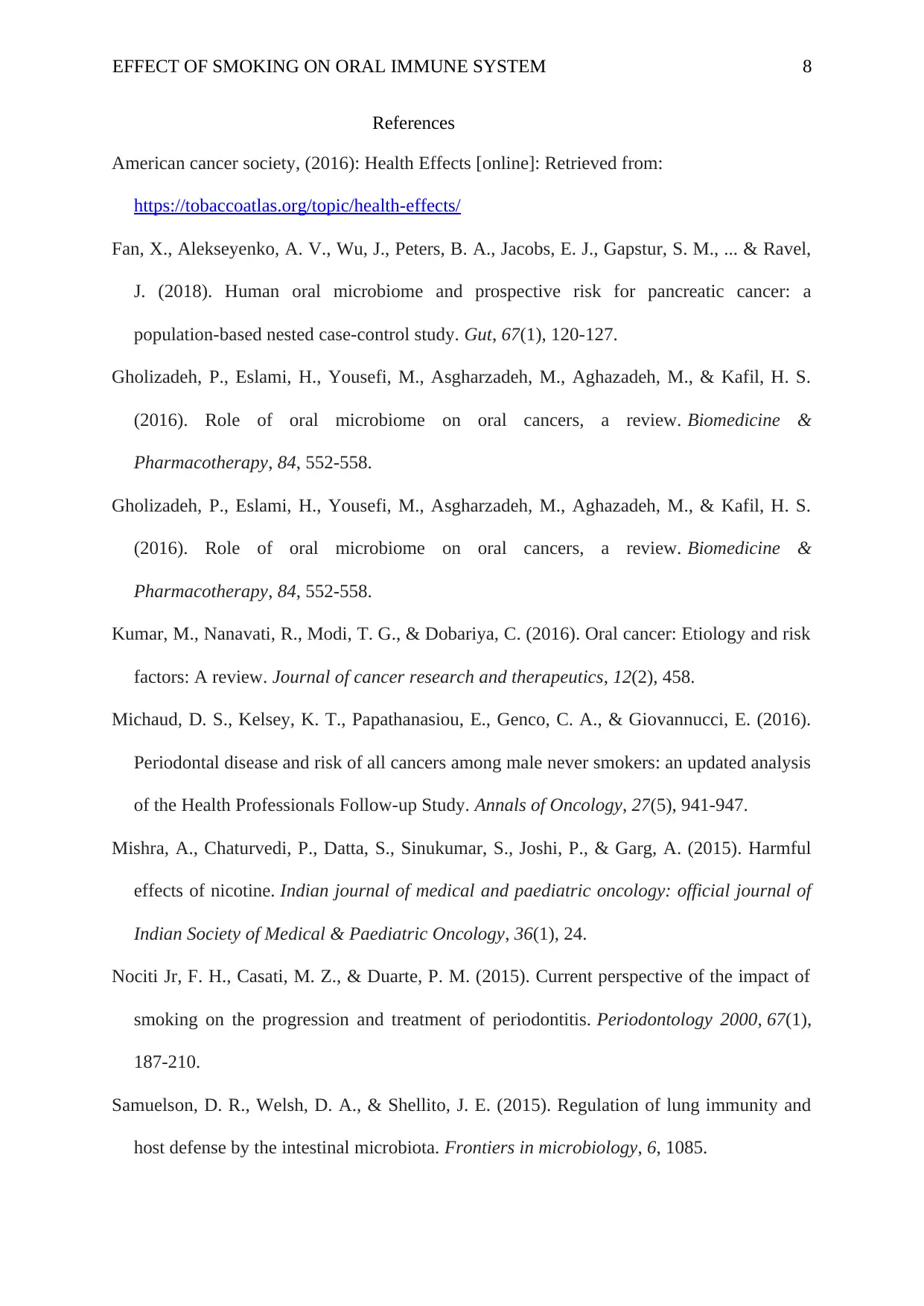
EFFECT OF SMOKING ON ORAL IMMUNE SYSTEM 8
References
American cancer society, (2016): Health Effects [online]: Retrieved from:
https://tobaccoatlas.org/topic/health-effects/
Fan, X., Alekseyenko, A. V., Wu, J., Peters, B. A., Jacobs, E. J., Gapstur, S. M., ... & Ravel,
J. (2018). Human oral microbiome and prospective risk for pancreatic cancer: a
population-based nested case-control study. Gut, 67(1), 120-127.
Gholizadeh, P., Eslami, H., Yousefi, M., Asgharzadeh, M., Aghazadeh, M., & Kafil, H. S.
(2016). Role of oral microbiome on oral cancers, a review. Biomedicine &
Pharmacotherapy, 84, 552-558.
Gholizadeh, P., Eslami, H., Yousefi, M., Asgharzadeh, M., Aghazadeh, M., & Kafil, H. S.
(2016). Role of oral microbiome on oral cancers, a review. Biomedicine &
Pharmacotherapy, 84, 552-558.
Kumar, M., Nanavati, R., Modi, T. G., & Dobariya, C. (2016). Oral cancer: Etiology and risk
factors: A review. Journal of cancer research and therapeutics, 12(2), 458.
Michaud, D. S., Kelsey, K. T., Papathanasiou, E., Genco, C. A., & Giovannucci, E. (2016).
Periodontal disease and risk of all cancers among male never smokers: an updated analysis
of the Health Professionals Follow-up Study. Annals of Oncology, 27(5), 941-947.
Mishra, A., Chaturvedi, P., Datta, S., Sinukumar, S., Joshi, P., & Garg, A. (2015). Harmful
effects of nicotine. Indian journal of medical and paediatric oncology: official journal of
Indian Society of Medical & Paediatric Oncology, 36(1), 24.
Nociti Jr, F. H., Casati, M. Z., & Duarte, P. M. (2015). Current perspective of the impact of
smoking on the progression and treatment of periodontitis. Periodontology 2000, 67(1),
187-210.
Samuelson, D. R., Welsh, D. A., & Shellito, J. E. (2015). Regulation of lung immunity and
host defense by the intestinal microbiota. Frontiers in microbiology, 6, 1085.
References
American cancer society, (2016): Health Effects [online]: Retrieved from:
https://tobaccoatlas.org/topic/health-effects/
Fan, X., Alekseyenko, A. V., Wu, J., Peters, B. A., Jacobs, E. J., Gapstur, S. M., ... & Ravel,
J. (2018). Human oral microbiome and prospective risk for pancreatic cancer: a
population-based nested case-control study. Gut, 67(1), 120-127.
Gholizadeh, P., Eslami, H., Yousefi, M., Asgharzadeh, M., Aghazadeh, M., & Kafil, H. S.
(2016). Role of oral microbiome on oral cancers, a review. Biomedicine &
Pharmacotherapy, 84, 552-558.
Gholizadeh, P., Eslami, H., Yousefi, M., Asgharzadeh, M., Aghazadeh, M., & Kafil, H. S.
(2016). Role of oral microbiome on oral cancers, a review. Biomedicine &
Pharmacotherapy, 84, 552-558.
Kumar, M., Nanavati, R., Modi, T. G., & Dobariya, C. (2016). Oral cancer: Etiology and risk
factors: A review. Journal of cancer research and therapeutics, 12(2), 458.
Michaud, D. S., Kelsey, K. T., Papathanasiou, E., Genco, C. A., & Giovannucci, E. (2016).
Periodontal disease and risk of all cancers among male never smokers: an updated analysis
of the Health Professionals Follow-up Study. Annals of Oncology, 27(5), 941-947.
Mishra, A., Chaturvedi, P., Datta, S., Sinukumar, S., Joshi, P., & Garg, A. (2015). Harmful
effects of nicotine. Indian journal of medical and paediatric oncology: official journal of
Indian Society of Medical & Paediatric Oncology, 36(1), 24.
Nociti Jr, F. H., Casati, M. Z., & Duarte, P. M. (2015). Current perspective of the impact of
smoking on the progression and treatment of periodontitis. Periodontology 2000, 67(1),
187-210.
Samuelson, D. R., Welsh, D. A., & Shellito, J. E. (2015). Regulation of lung immunity and
host defense by the intestinal microbiota. Frontiers in microbiology, 6, 1085.
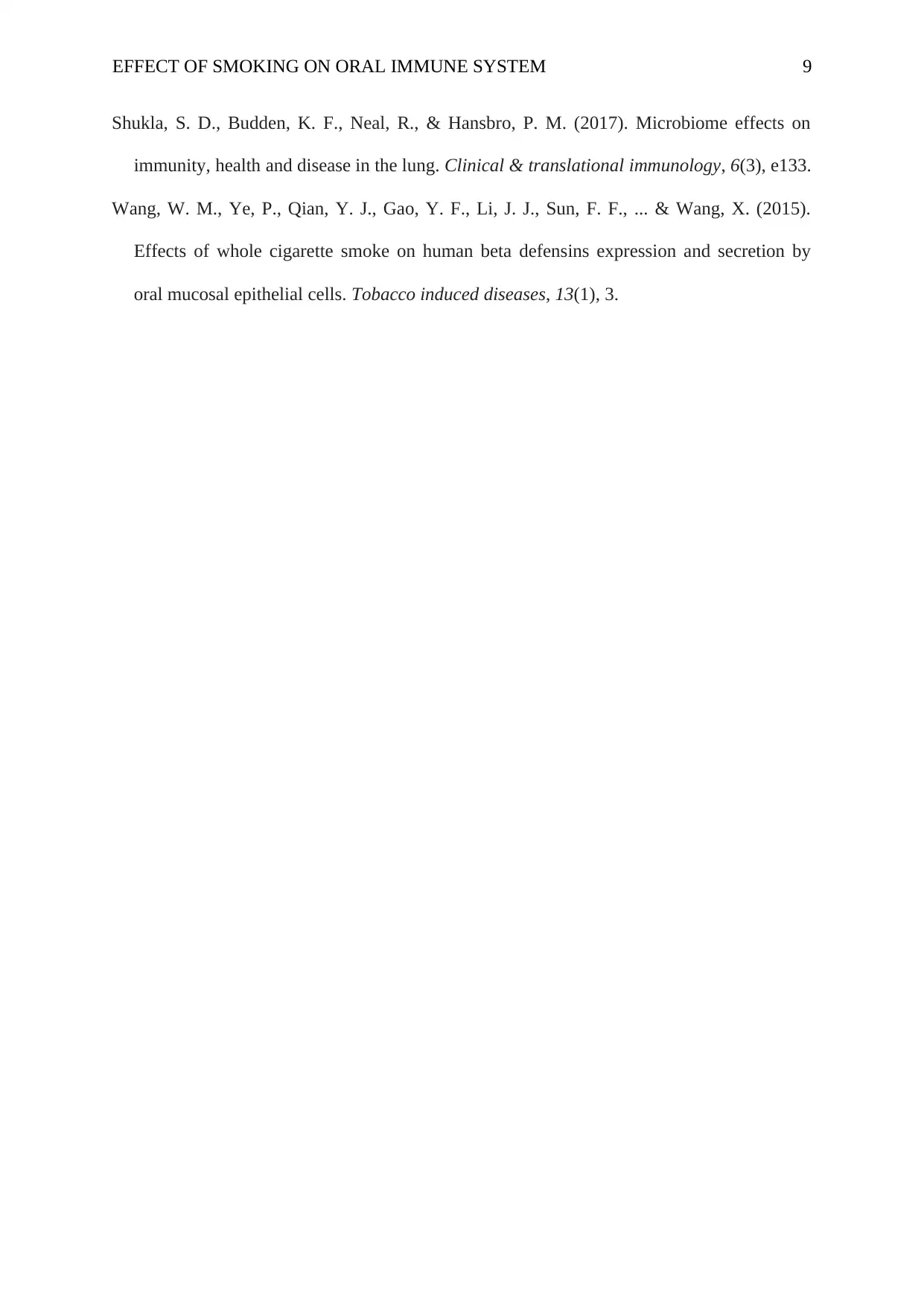
EFFECT OF SMOKING ON ORAL IMMUNE SYSTEM 9
Shukla, S. D., Budden, K. F., Neal, R., & Hansbro, P. M. (2017). Microbiome effects on
immunity, health and disease in the lung. Clinical & translational immunology, 6(3), e133.
Wang, W. M., Ye, P., Qian, Y. J., Gao, Y. F., Li, J. J., Sun, F. F., ... & Wang, X. (2015).
Effects of whole cigarette smoke on human beta defensins expression and secretion by
oral mucosal epithelial cells. Tobacco induced diseases, 13(1), 3.
Shukla, S. D., Budden, K. F., Neal, R., & Hansbro, P. M. (2017). Microbiome effects on
immunity, health and disease in the lung. Clinical & translational immunology, 6(3), e133.
Wang, W. M., Ye, P., Qian, Y. J., Gao, Y. F., Li, J. J., Sun, F. F., ... & Wang, X. (2015).
Effects of whole cigarette smoke on human beta defensins expression and secretion by
oral mucosal epithelial cells. Tobacco induced diseases, 13(1), 3.
⊘ This is a preview!⊘
Do you want full access?
Subscribe today to unlock all pages.

Trusted by 1+ million students worldwide
1 out of 9
Related Documents
Your All-in-One AI-Powered Toolkit for Academic Success.
+13062052269
info@desklib.com
Available 24*7 on WhatsApp / Email
![[object Object]](/_next/static/media/star-bottom.7253800d.svg)
Unlock your academic potential
Copyright © 2020–2025 A2Z Services. All Rights Reserved. Developed and managed by ZUCOL.





